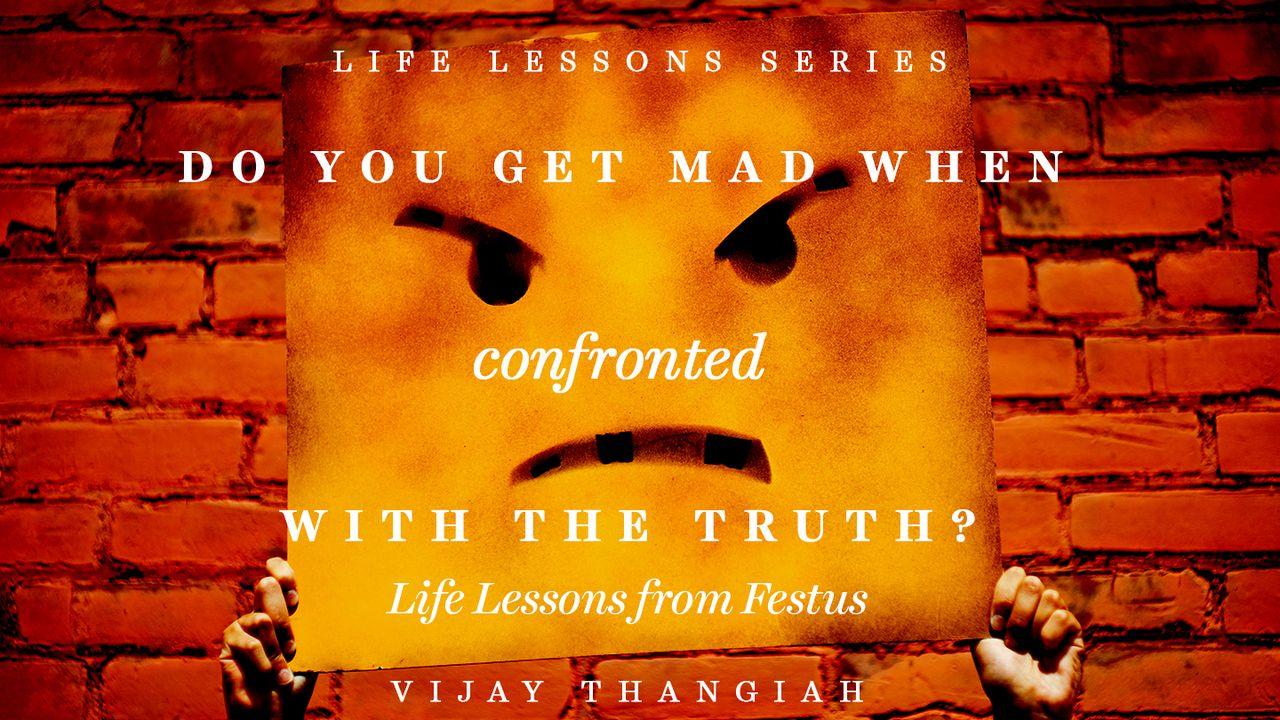Do You Get Mad When Confronted With the Truth?Sample

Truth Heals
After David’s sin of adultery with Bathsheba, the prophet Nathan went to King David and told him a parable about a rich man who had great wealth and his poor neighbor who had nothing but a little lamb, which he loved dearly. When the rich man had unexpected dinner guests, he stole that poor man’s lamb and used it as the main course for a banquet that he served to his guests. David was righteously indignant and promptly condemned the rich man, but he was caught totally off guard when Nathan said to him: “You are the man!” (2 Samuel 12:7) and then proceeded to condemn the king for his adulterous relationship with Bathsheba and his subsequent murder of her husband in his desperate but futile attempt
to cover up the adultery.
It was definitely hurting to be confronted with the truth. But instead of the being like the people in Jeremiah’s time who wanted to kill him for telling the truth, David repented and found healing from his sin. Psalm 51 is a beautiful psalm of repentance and healing.
Sad to say, many Christians though become quite adept at sidestepping the truth. Some make it a lifelong habit. Paul writing to the Corinthian church in 2 Corinthians 7:10 calls this a sorrow of the world. It’s sidestepping the truth to avoid dealing with reality.
Worldly sorrow is a pain over the consequences of sin that does not lead to repentance. It’s using every defense mechanism in the book so we don’t have to change the way we live. But Godly sorrow always produces a radical change.
A person who mourns over sin as committed against God and who seeks God for pardon will reform his life and truly repent. He who has grief for sin only because it will lead to disgrace or shame or because it will lead to poverty or pain will not necessarily break off from it and reform. It is only when it is seen that sin is committed against God and is evil in His sight that it will lead to a change of life.
To be “healed” is to be cured of a problem. A surgeon’s scalpel cuts us in order to cure us, and the truth of the Scriptures hurts us in order to heal us.
One major implication of this is that Christians—people who ought to be committed to the truth of the Scriptures—should not try to run from conviction. When the Spirit of God uses truth from the Scriptures, whether it is delivered through a sermon in the church, a conversation over coffee, a loving correction from a loved one or an idea brought to mind, we should not bury it.
If you flee from the truth, by denying your sin or your need to change in one area, then you will never be healed by the truth. Some people do this by leaving their church family (or their community group or their circle of friends) every time something is said that offends them. They never think that it might be God’s truth hurting them in order to heal them of their sinful thinking, their sinful attitudes, or their sinful actions.
Quote: “The notion of truth is not philosophical or abstract or theoretical. Truth is fundamentally about who God is.” - Oz Guinness
Prayer: Lord, I pray that I will allow the truth of Your Word to heal me. Amen
Scripture
About this Plan

Read in this 5-day devotional about a man called Festus, who called Paul mad when he was confronted with the truth. Learn about how truth hurts as well as heals and find out how truth can set you free.
More
Related plans

Sent to Shepherd: Leading in Church Planting

Loss: Encouragement After Losing a Loved One to Addiction

It's Snack Tme! - Thank You, Lord!

Living for Christ at Home: An Encouragement for Teens

3-Day Bible Plan: How to Truly Love Thy Neighbor in Today’s World

Don’t Waste the Wild: Discovering God's Plan in the Seasons That Test Us

7 Days to Discovering the Gift of You

How to Deal With Complicated People

7 Days of Joy for Women
